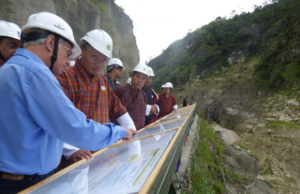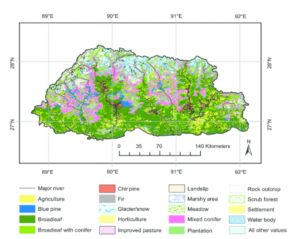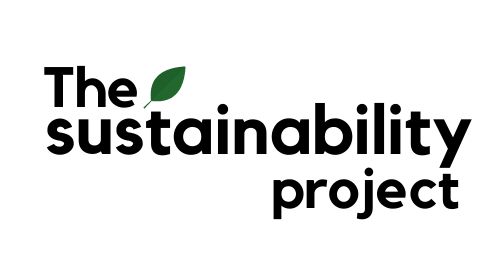Carbon is, essentially, in everything. The roof under which you live, the clothes you wear, the roads you walk on, and you; it’s all carbon.
So how can a country be carbon neutral in a world where anything and everything you lay your eyes on is composed of carbon?
A small kingdom deep in the Eastern Himalayas can answer that question. Bhutan, with a population of only around 790,000, has promised to stay carbon neutral for all time. In fact, Bhutan is not carbon neutral.
Bhutan is carbon negative.
Bhutan’s Promise
At the 2009 United Nations’ Copenhagen Summit, Bhutan made the promise to stay carbon neutral for all time. However, the voice of the tiny nation was left unheard. But while governments were arguing and pointing fingers at one another, Bhutan kept its word.
Finally, at the Paris Summit in 2015, they reiterated their promise, and they were heard. Word spread like wind, and everyone was astonished to find out that the little country had gone over and beyond its promise. Bhutan is not just carbon neutral. It is carbon negative. This means the whole country takes in more greenhouse gasses from the atmosphere than it emits!
Is it not adding up? Let me elaborate.
Not An Empty Promise
The Constitution of Bhutan mandates that at least 60% of its total land area must always remain under forest cover. As such, vast woodlands engulf approximately 70% of the country. This means that 70% of Bhutan is a net carbon sink, absorbing carbon dioxide.
This is not only due to its lush forest cover, but also due to the fact that it is relatively undeveloped—most people work in agriculture or forestry—emitting less than 2.5 million tons of CO2 each year. But the amount of CO2 sequestered by its forests dwarfs the amount of CO2 the country produces each year.
Additionally, Bhutan exports most of the renewable electricity that is generated exclusively from its hydroelectric plants, harnessing energy from the fast-flowing Himalayan rivers into India, propelling the country into its carbon-negative status.

Will This Sustain?
The Bhutanese culture invokes the belief that the world isn’t built around humans. The world has always existed, and humans have only come to inhabit it. This Bhutanese mindset causes the people to be conscious of their ecological footprint.
Read More: The Hummingbird Parable: What We Can Do For Earth
The Bhutanese government further drives this belief by providing abundant resources for their efforts. For example, it provides free electricity to rural farmers in a bid to alleviate firewood dependency.
It is also investing in sustainable transport and subsidising the purchase of electric vehicles. In fact, the Bhutanese government has partnered with Nissan to provide hundreds of electric cars to the country, and thousands more are to be supplied soon.
Such sustainable practices are ingrained in the Bhutanese culture. What was once led by their royalty is now bolstered by their democratic government.

What’s more, for the past 14 years, the Bhutanese Constitution has established a goal to measure progress not through its Gross Domestic Product (GDP), but through Gross National Happiness (GNH), which places importance on the preservation of the country’s rich natural environment. Its vision is to improve the happiness and well-being of the people environmentally, socio-culturally, and economically.
This GNH model provides a revolutionary understanding of development. It recognises the importance of economic growth while simultaneously providing due respect to the nation’s intrinsic culture and pristine environment.
To top it all off, the government has set up Bhutan For life: a government-driven initiative that aims to subsidise the maintenance of the country’s protected areas and biological parks through funds and donations. Once the funding goal is achieved, Bhutan will take over and cover the costs for protection without any external aid.
What Does This Mean For Us?
“Bhutan has a vested interest in trying to slow down climate change,” says the analyst at the UK-based Energy & Climate Intelligence Unit, Matt Finch. “Bhutan (could have said) ‘we want to be more connected to our neighbors, we want more industrialization, we want more economic development… but they didn’t.”
The reality of climate change and its impact on our world is growing more conspicuous by the minute. What if the rest of the world replicates the ‘Bhutan for life’ idea and sets up ‘Earth for Life’? After all, many countries face similar issues. They, too, can help win the world’s fight for sustainability.
Read: Convincing the Unconvinced to Take Steps for the Earth
It is important to highlight that Bhutan is a small, developing nation, and their method would undoubtedly see challenges on a bigger scale. However, Bhutan’s practices do show what can be achieved when environmental sustainability is a community’s primary objective.
In a TED talk, the former Prime Minister of Bhutan, Tshering Tobgay, explained that becoming carbon neutral is ultimately attainable for many countries by working as a global collective.


Amazing!!
Inspirational country! Well penned Advita.
Splendid material Advita. A lot to learn from Bhutan. How far can state and individuals emulate is something that needs to be seriously pursued. A big inspiration for developing nations.
What’s the use of carbon when people are poor? Anyone here to answer? The carbon benefits the whole world but not the guardians of the carbon. This is a well written factual article but where is the part on how to keep Bhutanese maintain the status quo? Out of desperation, we may just cut all trees and use all waterways to develop the country like other greedy countries. Better help Bhutan remain same forever.
Good article